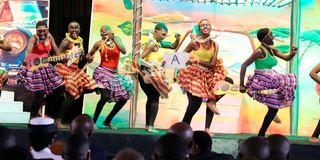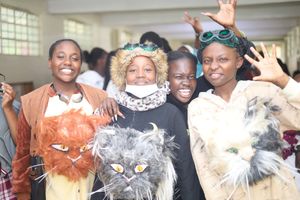
Artar Girls High School presents a cultural dance during the State Concert for the winners of the 63rd Kenya National Drama And Film Festival at State House, Nakuru on April 16, 2025.
The Kenya National Drama and Film Festival that has been happening in Nakuru County is a quite an old event, in a manner of speaking. This is its 63rd Edition. This festival began as a schools’ competition. Today it is a meeting of thousands of young Kenyans from all parts of the country.
Nakuru hosted little boys and girls in kindergarten, primary school children, junior school and secondary school youth, and young adults in college and university. The combination of drama and film brought to Nakuru a harvest of art, literature and culture in diverse genres.
There was the traditional drama on stage, dramatised song and dance, spoken word poetry, mime, solo verse etc, in the drama section. Film, which has grown exponentially since 2012 had documentary, advertisement, feature film and even podcast. This show gets better every year.
However, the two weeks’ festival, whose theme was ‘liberating technology to nurture talent, while inculcating value for social prosperity’ was nearly marred by an unnecessary sideshow. The Malala wahala was an uncalled for distraction. This was a drama festival. Why the melodrama on a national stage? The contested play, ‘Echoes of War,’ was just a play. It had been scripted, rehearsed and presented at Butere Girls’ High School and other competitions leading to the national stage. On its own, the play would not cause a revolution; not even in the very school where it was originated.
Plays such as performed at the festival are hardly available to audiences beyond the schools. Hardly does the public attend these kinds of shows. But all the plays performed at the festival at least do one key thing: they remind the learners and everyone else who attends the festival of the importance of the arts in our everyday life. And this is how the adjudicators and anyone else who had issues with the play should have seen it. What did the play remind the audiences of? People who watch theatre have their own minds. They can decide for themselves whether there was a lesson in the drama they watched or not.
As the joke currently doing the rounds on social media goes, those who contested the performing of ‘Echoes of War’ removed the play from the school hall (a private space) into the streets and increased the cast! All actions have consequences - intended and unintended. Sometimes adults need to let young people be young.
But on a different note, the drama festival does something that no politician or government officer in Kenya can do. This festival is the truest meeting of all regions, tribes, religions, social classes, political affiliations, cultures, languages, ages etc. This is the place where a song can be performed in any language without fear of having to explain oneself as it happens in other public spaces in Kenya. It is not surprising to watch a thrilling traditional dance accompanying a Luhya or Gusii song performed by a school from Meru or a traditional Digo dance and song brought on stage by a primary school from Kitale.
This festival allows young Kenyans to cross cultural, linguistic, class, gender, religious or regional borders that they would not have imagined possible to transcend in their respective ‘local’ identities. The songs, dances, poetry and plays enable the young boys and girls in primary and secondary schools to ‘learn’ outside the classroom how other people, different from themselves, see, understand and relate to the world around them and beyond.
A girl from somewhere in Kagumo in Kirinyaga County might just meet a boy from somewhere in Usenge, Siaya County. The lessons on how the Luo and Kikuyu ‘see’ one another, lessons that parents might have drummed into their young minds, could be totally undone in the youthful exuberance and a future love and life imagined on the sidelines of the festival.
This festival is also a reminder of the pool of talents in the arts here. Right from the kindergarten lot to the universities, there are so many young people in this country who can sing, dance and act professionally if their talents are nurtured. The government has to walk its talk - it has to invest in the Kenya Film School and establish a national Drama School.
History shows that some of the living best Kenyan actors were products of the Kenya Drama School. If one of the government’s stated agenda for job creation is to support young people to set up business and create employment, then it should increase the amount of money available for grants for arts and culture, and spread it throughout the country.
There is no doubt that a film industry could be established in Kenya. On the evidence of the submissions to the festival by primary, secondary, colleges and universities, there is a huge creative granary and technical capacity to produce documentaries and films in this country. There is a very big unexploited market for film in local languages.
The thriving market for popular music in local languages is an indicator that there is an audience willing to pay for local film productions. Yet, production costs are too high. The government can deliberately work with the festival to identify and support individuals and groups to produce films for the local and regional markets. This is the secret of the Nigerian film industry.
It is fun to be at the National Drama and Film Festival. Travelling to and from the festival is one long sightseeing experience for many of the young people, and even the adults accompanying them. If one is from, say Mandera, a journey to Nakuru is one marvelous encounter with peoples, towns, hills, valleys, mountains, foods, smells, sounds etc all the way into the Rift Valley, one that the learner may only have come across in geography books. From the Coast, travelling into the hinterland of Kenya, seeing dry land (no rivers, lakes or the ocean), people who look different from those one is used to, eating different food and hearing even one’s Kiswahili spoken in a different lafudhi is dramatic in itself.
It is fun to watch a stage dance or play and see very young Kenyans imitate the accents and mannerisms of their parents, teachers, policemen, clergy or politicians. Comedy is a very difficult genre to produce. Yet, nearly every play on stage at this festival has a comical part. It shows how much effort the teachers, pupils, school managers and parents invest in these young people. The dances and songs are absolutely spirit uplifting. Even a sad song tells a story. Indeed, more adults (parents) need to attend this festival. They will discover a character of their children that they had never imagined.
There is no doubt that young Kenyans enjoy this festival. After all, some have already started to prepare what items to take to the next one. It is about competition. But it is also about appearing at the ‘nationals,’ meeting old and new friends, ‘showing’ old friends what you have brought on stage in the new year, hoping to ‘beat’ them and prove a point. This is about the past, the present and the future, as all imagined through drama by a people we call ‘future leaders.’ It is always a worthy time spent at the festival, despite Malala wahala, the rain, dust, heat and cold.
The writer teaches at the University of Nairobi






